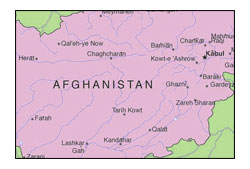 The Afghan government won’t allow any law that would force women to have sex with their husbands or prevent them from leaving their homes, Afghanistan’s ambassador to Washington said yesterday.
The Afghan government won’t allow any law that would force women to have sex with their husbands or prevent them from leaving their homes, Afghanistan’s ambassador to Washington said yesterday.
“Definitely not,” Ambassador Said Jawad said in an interview on Bloomberg Television’s “Political Capital with Al Hunt” airing this weekend. “This is not the law yet, and it will not become the law, because it contradicts some important principles of the Afghan constitution.”
The legislation that would govern the country’s Shia minority drew condemnation a week ago from President Barack Obama, who called it “abhorrent,” as well as from European leaders and United Nations officials. Leaders of the North Atlantic Treaty Organization said it would be hard to justify international contributions to Afghanistan if the country fails to uphold universal values and women’s rights. Jawad is the first Afghan official to say unequivocally it won’t become law.
Jawad praised Obama’s message of outreach to the Muslim world during his recent trip to Turkey, Iraq and Europe as having a “tremendous effect.” His speech and visit to the Hagia Sophia mosque in Turkey sent “very, very clear signals that the United States is with the moderate forces of Islam and Muslims who are suffering, who are the prime victims of terrorism and extremism in their own country.”
Safe Havens
Jawad said Pakistan isn’t doing enough to root out training camps and safe havens sheltering terrorists who cross the Afghan border with impunity. Although Pakistan’s civilian government “is committed to fighting extremism,” it doesn’t “have the necessary capabilities to do so.”
“Pakistani security institutions do not see extremism and terrorism as a serious threat to Pakistan, Afghanistan and the world; they see India as the main threat,” Jawad said. “We have not seen any indications that the support” by Pakistan’s military and intelligence agencies for terrorist groups “has discontinued. The support is going on.”
Jawad said his government isn’t concerned about the failure of a NATO summit last week to commit significantly more troops to his country. NATO allies, who currently have 58,000 troops in Afghanistan fighting a resurgent Taliban, pledged to send 5,000 additional non-combat troops and trainers.
“The presence of NATO is a significant political asset for us in Afghanistan, but at the end of the day, this war is about Afghanistan and the United States,” he said. “If we fully commit ourselves, it’s easy to achieve our objective while working together,” instead of “expecting deliveries from some of our partners that may not come along.”
Five More Years
Jawad said he agreed with the commander of U.S. forces in Afghanistan, General David McKiernan, that U.S. troops would be there for at least another five years.
“We hope the political engagement will stay there for many years to come,â€
In a separate interview on the show, Senator Carl Levin, chairman of the Armed Services committee, said the Afghan war has become too “Americanized” and criticized NATO for failing to meet its “commitments.” Germany, France and other Europeans should “come through with fighting forces” and smaller countries should provide funding, he said.
Levin said he hopes the Afghan army can expand from about 85,000 to 135,000 within a year. When it reaches 130,000 to 140,000 troops, it should be able to handle the country’s security, along with border protection, the Michigan Democrat said.
Open Border
“It is that open border with Pakistan that terrorists flow across,” Levin said.
Asked about widespread corruption that has undermined trust in the Afghan police, Jawad said that the force could become a model institution if enough resources are devoted to its overhaul.
After the ouster of the Taliban, “there was an undisciplined large group of militia that called themselves the Afghan army. By working together with the United States, we got rid of them. We have a very capable professional army now,” Jawad said, praising the Obama administration’s emphasis on building up Afghan security forces. “There is no reason we can’t achieve the same results” with the police.
Jawad called Richard Holbrooke, the special representative for Afghanistan and Pakistan, “a tremendous force of change,” and said Afghans are “really counting on him to deal with the regional aspects of terrorism in Afghanistan and Pakistan in an effective way.”
Sex Law
In a separate interview following his television appearance, Jawad said Afghan President Hamid Karzai last month signed the marital-rights law, which was debated and approved by Afghanistan’s parliament, without being aware of all its articles. The UN Development Fund for Women condemned the law as legalizing “rape of a wife by her husband.”
Karzai on April 4 forwarded the draft law to the Ministry of Justice and Supreme Court for review, and is confident it won’t pass constitutional muster because it doesn’t protect women’s equality, Jawad said. Regardless, Karzai won’t publish the law, so it can’t take effect, he added.
Karzai’s presidential term ends in May, and Afghanistan will hold national elections in August.
Shias represent 10 percent of the population, according to Jawad, and the legislation was originally intended to ensure additional protections for them as a minority group. Jawad said the draft law would have required a Shia wife to “satisfy the sexual desire of the husband” and allowed her to leave the house only for “work, education or other necessities.”
 Eurasia Press & News
Eurasia Press & News


